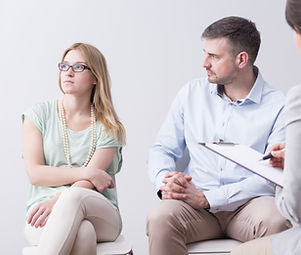FAMILY MATTERS
Individuals with disabilities often depend on family members for assistance with daily living activities in various ways throughout their lives. Shifting roles and responsibilities can strain relationships and lead to stressful situations and conflicts affecting important relationships.
CO-PARENTING
Custody, visitation, child support, holidays, religion, language
DIVORCE & SEPARATION
Caregiving, living arrangements, and decision making for children, and other dependents.
ROLES AND RESPONSIBILITIES
Balancing autonomy and risk, needs and independence for immediate and extended family members
DECISION MAKING
Planning for living arrangements, health care, resources, service providers, and transitions
PARENT/CHILD
Curfews, behaviors, grades, school attendance, family responsibilities, PINS

When families are hurting, a trained professional can often help address conflicts and work toward solutions. Community Dispute Resolution Centers (CDRCS) offer a variety of family mediations and facilitations, for couples, parents and children, siblings, or across the generations. These can be one-time sessions for an hour, or a series of meetings to deal with several issues and to gradually develop solutions that work for all.
Family conflicts can be some of the most difficult to face, where important relationships are challenged by difficult situations and decisions. An impartial third party can help all sides hear one another and discuss creative solutions that may be just what your family needs. In mediation, conflict coaching, circles and conferences, family members are encouraged to raise their concerns about issues that matter for them. When all sides have been heard, and when all parties reach mutual agreement, successful resolution is more likely.
MEDIATION

Where professionally trained mediators help people discuss their concerns and differences in difficult decisions, situations, and relationships. During mediation sessions, people are encouraged to raise issues, express perspectives, share interests, discuss options, and develop their own solutions. As a result of mediation, people are better able to understand and cooperate with each other, and when possible, reach an agreement on how to move forward and resolve their issue(s).
CONFLICT COACHING

Where professionally trained coaches help people understand their conflict, express their concerns, and consider their options in difficult conversations, decisions, and situations. In one-on-one conflict coaching sessions, individuals can gain perspective about their situations and relationships. Conflict coaching is useful to prepare for mediation, circles and conferences, to help people identify their interests, issues and responses.
RESTORATIVE PRACTICES

Where professionally trained facilitators convene people involved by a situation or relationship for meeting together to develop community, identify shared or different needs, plan for changes, or address harm. In these meetings people are encouraged to build connections, share how they are affected by how things are, and explore ways to go forward. During circles and conferences, everyone included has opportunities to express their perspectives, discuss the situation and choose how they want to address their issues to best meet their concerns.
CONTACT US

